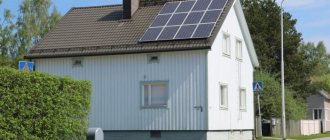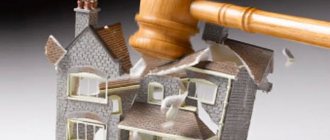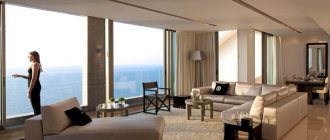What kind of house can be considered residential?
The law does not contain the concept of “dacha”.
But the wording “garden house” was introduced. This is recognized as a building that is used for seasonal residence. In accordance with Article 16 of the Housing Code of the Russian Federation, a house, its part or an apartment is recognized as a residential premises. But from January 1, 2021, Federal Law No. 217 dated July 29, 2021, it was recognized that a garden house will be classified as a residential premises if the appropriate transfer is made.
If a citizen registered ownership of a garden house before January 1, 2021, re-registration is not required. The Unified State Register must indicate that the premises are residential.
Reference! If a record is made in the Unified State Register of Real Estate that the building is non-residential, registration will not be possible. It does not matter whether it is located in SNT, intended for farming or individual housing construction.
To clarify the status, an extract from the Unified State Register is required. It can be ordered on the Rosreestr website by paying the state fee.
Requirements for registration of a residential single-apartment building
The main group of requirements are technical:
- number and purpose of premises (minimum - 1 living room, kitchen, bathroom, room for a heating boiler (in the absence of central heating);
- area of premises, their width;
- ceiling height (depending on the climatic region, at least 2.5 m for the first floor);
- compliance with insolation standards (the area and characteristics of glazing are determined);
- availability of communications, engineering systems (water supply, sewerage system, electricity, heating, ventilation);
- the object must be capital, placed on a foundation.
Technical standards are specified in SNiP 31-02-2001. Additionally, fire safety requirements and hygiene standards (SanPiN) are taken into account. In some cases, it is necessary to prove that the building is already used as housing (the owners permanently reside in it).
How to recognize a garden house as residential: requirements and conditions
To recognize a house as residential, it is necessary to check whether it meets the requirements.
The criteria are stated in the Decree of the Government of the Russian Federation No. 47 of January 28, 2006:
- The house must be located in a residential area in accordance with urban zoning or on land plots intended for gardening.
- Load-bearing structures must be reliable, free from damage and deformation.
- The house must be connected to utility systems. It must have water, electricity, heating, and a sewerage system. If the area is gasified, then gas can be installed in the house.
- External structures must be thermally insulated. The property must be protected from water, snow and rain.
- The house must have at least one room and a kitchen.
- The floor level should be higher than the ground level. Residential premises should not be located in basements or on ground floors.
- The house must meet the requirements for noise insulation and electromagnetic radiation.
It is possible to convert a garden house into a residential one only with the consent of all owners.
Construction of a residential building on a garden plot
According to Art. 1 of the Town Planning Code of the Russian Federation, an individual residential building has the following features:
- Detached building (i.e. not an annex)
- Number of ground floors – maximum 3;
- Height – up to 25 meters;
- Availability of rooms and auxiliary premises;
- Not intended for dividing into parts of a residential building.
The construction of a residential building on a garden plot does not differ from the construction on a land plot intended for individual housing construction, with the exception of the following points:
1. Territorial zone. According to paragraph 2 of Art. 23 217-FZ, the construction of capital construction projects on garden land plots is permitted only if such land plots are included in the territorial zones provided for by the rules of land use and development, in relation to which town planning regulations have been approved that establish the maximum parameters for such construction. For example, a garden plot of land is located in the territorial zone CX-1 - Gardening Zone, but the land use and development rules in this zone do not provide for the construction of capital construction projects, so it will not be possible to obtain permits for construction.
TIP: To find out in which territorial zone the land plot is located, you need to order an urban planning plan for the land plot (GPZU) from the local government - free of charge, period - 1 month. or an extract from the information system for supporting urban planning activities (extract from ISOGD) - usually for a fee (up to 1000 rubles), period - up to 1 week.
2. Extension of the dacha amnesty. Since August 2018, there is no requirement to obtain permission to build a residential building. Instead of a construction permit, it is necessary to receive a notification about the compliance of the planned facility and subsequently a notification about the compliance of the constructed facility with legal requirements.
But in connection with the extension of the second dacha amnesty until March 1, 2021 , owners can register existing houses in a simplified manner without sending a notification to the administration and complying with the requirements of the town planning regulations (Part 12 of Article 70 218-FZ). Cadastral registration and registration of ownership of a residential building will be carried out on the basis of a technical plan and declaration.
Moreover, until 03/01/2021, the verification of whether a building is residential or non-residential is determined by the cadastral engineer, and not by the local government.
After 03/01/2021, registration and registration of the house will be carried out in a notification manner, that is, through notifications about planned construction / about the completion of construction with a mandatory visit to the site by specialists from the administration.
Algorithm of actions
The procedure for converting a garden house into a residential one is carried out in accordance with paragraphs 55-63 of Decree of the Government of the Russian Federation No. 47.
The owner must:
- Contact a cadastral engineer to conduct a technical inspection.
- Collect and submit documents to the district administration.
- Get a decision from local governments.
➟ Technical inspection
Before submitting an application, it is necessary to prepare a boundary plan and cadastral passport.
Documents confirm the compliance of the property with the requirements established by law. To obtain papers, you need to invite a cadastral engineer. You can only contact specialists who work in companies registered with the SRO for engineering surveys. The service is paid for by the owner, it will cost 15,000 - 20,000 rubles.
The cadastral engineer carries out all the necessary measurements and prepares a conclusion. Based on it, the owner is issued a cadastral passport and a boundary plan.
➟ Collection and submission of documents
The basis for the procedure is an application from a citizen.
It is drawn up in free form. The document must include:
- applicant's details (full name, residential address, contact phone number);
- cadastral number of the house;
- cadastral number of the land plot;
- a request to transfer the house from garden to residential;
- way to get a solution.
In addition to the application, an extract from the Unified State Register is provided, which reflects the main characteristics of the object and the details of the owners. If ownership has not been registered, then a title document is needed. If there are several owners, the consent of each of them is required. A conclusion issued by a cadastral engineer is also required.
The application and package of documents are sent to local authorities in person or through the MFC, the State Services portal.
➟ Getting a solution
The procedure for reviewing documents is determined by law. The procedure is allotted 45 days from the moment the citizen submits the application. After studying the package of documents, specialists make a decision on recognizing the garden house as residential or refusing to carry out the procedure.
➟ Making changes to Rosreestr
If the decision of the local government is positive, the documents are transferred by the administration to the Rosreestr authorities. The procedure for registering the new status of real estate is underway. The owner must pay a state fee of 200 rubles.
Documents Statistics on documents and execution of orders
GOVERNMENT OF THE RUSSIAN FEDERATION
RESOLUTION
dated January 28, 2006 No. 47
Moscow
On approval of the Regulations on recognizing premises as residential premises, residential premises unsuitable for habitation, an apartment building in disrepair and subject to demolition or reconstruction, a garden house as a residential building and a residential building as a garden house
(As amended by resolutions of the Government of the Russian Federation dated 08/02/2007 No. 494, dated 04/08/2013 No. 311, dated 03/25/2015 No. 268, dated 03/25/2015 No. 269, dated 07/09/2016 No. 649, dated 08/02/2016 No. 746, from 02/28/2018 No. 205, dated 12/24/2018 No. 1653, dated 08/21/2019 No. 1082, dated 11/29/2019 No. 1535, dated 04/24/2020 No. 581, dated 07/27/2020 No. 1120)
The Government of the Russian Federation decides: (From January 1, 2019, as amended by Decree of the Government of the Russian Federation dated December 24, 2018 No. 1653)
1. Approve the attached Regulations on recognizing premises as residential premises, residential premises unsuitable for habitation, an apartment building in disrepair and subject to demolition or reconstruction , a garden house with a residential building and a residential building with a garden house. (As amended by Decree of the Government of the Russian Federation dated 08/02/2007 No. 494; from January 1, 2021 as amended by Decree of the Government of the Russian Federation dated 12/24/2018 No. 1653)
2. Recognize as invalid the Decree of the Government of the Russian Federation of September 4, 2003 No. 552 “On approval of the Regulations on the procedure for recognizing residential buildings (residential premises) as unfit for habitation” (Collected Legislation of the Russian Federation, 2003, No. 37, Art. 3586).
Chairman of the Government
Russian Federation M. Fradkov
APPROVED by Decree of the Government of the Russian Federation of January 28, 2006 No. 47
REGULATIONS on recognizing premises as residential premises, residential premises as unsuitable for habitation, an apartment building as unsafe and subject to demolition or reconstruction, a garden house as a residential building and a residential building as a garden house
(As amended by resolutions of the Government of the Russian Federation dated 08/02/2007 No. 494, dated 04/08/2013 No. 311, dated 03/25/2015 No. 268, dated 03/25/2015 No. 269, dated 07/09/2016 No. 649, dated 08/02/2016 No. 746, from 02/28/2018 No. 205, from 12/24/2018 No. 1653, from 08/21/2019 No. 1082, from 11/29/2019 No. 1535, from 04/24/2020 No. 581)
I. General provisions
1. These Regulations establish the requirements for residential premises, the procedure for recognizing residential premises as suitable for living in and the grounds on which residential premises are recognized as unsuitable for living in, and in particular an apartment building is recognized as unsafe and subject to demolition or reconstruction, as well as the procedure for recognizing a garden house as a residential building and a residential building with a garden house. (As amended by Decree of the Government of the Russian Federation dated 08/02/2007 No. 494; from January 1, 2021 as amended by Decree of the Government of the Russian Federation dated 12/24/2018 No. 1653)
2. This Regulation applies to residential premises in operation, regardless of the form of ownership, located on the territory of the Russian Federation.
3. This Regulation does not apply to residential premises located in capital construction projects, the commissioning of which and registration with the state have not been carried out in accordance with the Town Planning Code of the Russian Federation.
4. Residential premises are recognized as isolated premises that are intended for the residence of citizens, are immovable property and are suitable for habitation.
5. Residential premises are recognized as:
residential building - an individually defined building, which consists of rooms, as well as premises for auxiliary use, intended to satisfy citizens' household and other needs related to their residence in it;
apartment - a structurally separate room in an apartment building, providing direct access to the common areas in such a house and consisting of one or more rooms, as well as premises for auxiliary use, intended for citizens to satisfy household and other needs related to their residence in such a building in a separate room;
room - part of a residential building or apartment, intended for use as a place of direct residence of citizens in a residential building or apartment.
51. A garden house is a building for seasonal use, intended to satisfy citizens’ household and other needs related to their temporary stay in such a building. (Added from January 1, 2021 - Decree of the Government of the Russian Federation dated December 24, 2018 No. 1653)
6. An apartment building is a collection of two or more apartments that have independent access either to a land plot adjacent to a residential building or to common areas in such a building. An apartment building contains elements of common property of the owners of premises in such a building in accordance with housing legislation.
Premises for auxiliary use, as well as premises that are part of the common property of the owners of premises in an apartment building, are not allowed to be used as residential premises.
7. Assessment and inspection of a premises in order to recognize it as a residential premises, a residential premises suitable (unsuitable) for habitation of citizens, as well as an apartment building in order to recognize it as unsafe and subject to demolition or reconstruction are carried out by an interdepartmental commission created for these purposes (hereinafter referred to as the commission) , and are carried out to ensure that the specified premises and house comply with the requirements established in these Regulations.
The executive authority of a constituent entity of the Russian Federation creates, in accordance with the procedure established by it, a commission to evaluate residential premises of the housing stock of a constituent entity of the Russian Federation, as well as other residential premises in the cases established by these Regulations. The commission includes representatives of this executive body of the constituent entity of the Russian Federation. An official of the specified executive body of the constituent entity of the Russian Federation is appointed as the chairman of the commission. (As amended by Decree of the Government of the Russian Federation dated August 2, 2016 No. 746)
The local government body creates, in accordance with the procedure established by it, a commission to evaluate residential premises of the housing stock of the Russian Federation, apartment buildings in federal ownership, municipal housing stock and private housing stock, with the exception of cases provided for in paragraph 71 of these Regulations. The commission includes representatives of this local government body. An official of the specified local government body is appointed as the chairman of the commission. (As amended by Decree of the Government of the Russian Federation dated August 2, 2016 No. 746)
The commission also includes representatives of bodies authorized to conduct regional housing supervision (municipal housing control), state control and supervision in the areas of sanitary-epidemiological, fire, environmental and other safety, consumer rights protection and human well-being (hereinafter referred to as state supervision bodies ( control), as well as, if necessary, including in the case of conducting an inspection of premises on the basis of a consolidated list of objects (residential premises) located within the boundaries of the emergency zone provided for in paragraph 42 of these Regulations - representatives of architecture, urban planning and relevant organizations, experts certified in accordance with the established procedure for the right to prepare expert opinions on design documentation and (or) engineering survey results (as amended by Decrees of the Government of the Russian Federation dated 02/28/2018 No. 205, dated 07/27/2020 No. 1120)
The owner of the residential premises (the person authorized by him), with the exception of the bodies and (or) organizations specified in paragraphs two, three and six of this paragraph, is involved in work in the commission with the right of an advisory vote and is subject to notification of the time and place of the meeting of the commission in the manner established by the executive body of the constituent entity of the Russian Federation or the local government body that created the commission. The procedure for participation in the work of the commission of the owner of a residential premises that was damaged as a result of an emergency situation is established by the executive body of the constituent entity of the Russian Federation or the local government body that created the commission. (As amended by Decrees of the Government of the Russian Federation dated 08/02/2016 No. 746, dated 07/27/2020 No. 1120)
If the commission evaluates the residential premises of the housing stock of the Russian Federation or an apartment building that is federally owned, a representative of the federal executive body exercising the powers of the owner in relation to the property being assessed is included in the commission with the right of casting vote. A representative of a state body of the Russian Federation or an enterprise (institution) subordinate to it is also included in the composition of the commission with the right to a casting vote, if the specified body or its subordinate enterprise (institution) owns the property being valued under the corresponding property right (hereinafter referred to as the right holder).
The decision to recognize premises as residential premises, residential premises suitable (unsuitable) for citizens to live in, as well as an apartment building as unsafe and subject to demolition or reconstruction is made by the executive authority of a constituent entity of the Russian Federation or a local government body (with the exception of residential premises of the housing stock of the Russian Federation and apartment buildings , which are in federal ownership). If the commission evaluates the residential premises of the housing stock of the Russian Federation, as well as an apartment building in federal ownership, a decision is made to recognize the premises as residential premises, residential premises suitable (unsuitable) for citizens to live in, as well as an apartment building as unsafe and subject to demolition or reconstruction is adopted by the federal executive body exercising the powers of the owner in relation to the property being valued, and if the property being valued is owned by the relevant property right to the federal executive body or its subordinate enterprise (institution), the specified decision is made by such federal executive body. The decision is made on the basis of the conclusion of the commission, drawn up in the manner prescribed by paragraph 47 of these Regulations. (As amended by Decree of the Government of the Russian Federation dated April 24, 2020 No. 581)
(Clause as amended by Decree of the Government of the Russian Federation dated March 25, 2015 No. 269)
71. If it is necessary to assess and inspect a premises in order to recognize a residential premises as suitable (unsuitable) for citizens to live in, as well as an apartment building in disrepair and subject to demolition or reconstruction within 5 years from the date of issuance of permission to put the apartment building into operation, such assessment and inspection carried out by a commission created by the executive authority of a constituent entity of the Russian Federation in accordance with paragraph two of clause 7 of these Regulations.
If the commission created by the executive authority of a constituent entity of the Russian Federation includes officials who issued a permit for the construction of an apartment building or who issued a permit to put an apartment building into operation, as well as representatives of state supervision (control) bodies, local government bodies, organizations and experts certified in the prescribed manner for the right to prepare expert opinions on design documentation and (or) the results of engineering surveys that participated in the preparation of documents necessary for issuing these permits, the executive body of the constituent entity of the Russian Federation decides to create another commission for the purpose of assessing and inspection of a premises or apartment building in the case specified in paragraph one of this paragraph. At the same time, the specified persons and representatives are not included in the composition of such a commission.
The composition of the commission created by the executive authority of a constituent entity of the Russian Federation for the purpose of assessing and inspecting a premises or apartment building in the case specified in paragraph one of this paragraph is formed in accordance with paragraphs two and four of paragraph 7 of these Regulations. At the same time, this commission must include experts who are duly certified for the right to prepare expert opinions on design documentation and (or) engineering survey results.
(Clause supplemented - Decree of the Government of the Russian Federation dated 02.08.2016 No. 746)
8. The local government body, if there is an application from the owner of the premises, makes a decision to recognize private residential premises located on the relevant territory as suitable (unsuitable) for citizens to live on based on the relevant conclusion of the commission. (As amended by Decree of the Government of the Russian Federation dated August 2, 2016 No. 746)
II. Requirements that residential premises must meet
9. Residential premises should be located primarily in houses located in a residential area in accordance with urban zoning, as well as within the boundaries of the territory where citizens conduct gardening or vegetable gardening for their own needs. (From January 1, 2019, as amended by Decree of the Government of the Russian Federation dated December 24, 2018 No. 1653)
10. Load-bearing and enclosing structures of residential premises, including those included in the common property of the owners of premises in an apartment building, must be in working condition, in which violations that arise during operation in terms of deformability (and in reinforced concrete structures - in terms of crack resistance) do not lead to disruption of the performance and load-bearing capacity of structures, the reliability of a residential building and ensure the safe stay of citizens and the safety of engineering equipment.
The foundations and load-bearing structures of a residential building, as well as the foundations and load-bearing structures that are part of the common property of the owners of premises in an apartment building, must not have any destruction or damage leading to their deformation or the formation of cracks, reducing their load-bearing capacity and impairing the operational properties of the structures or residential building as a whole.
11. Residential premises, as well as the common property of the owners of premises in an apartment building, must be arranged and equipped in such a way as to prevent the risk of injury to residents when moving in and around the residential premises, when entering and leaving the residential premises and residential building. , as well as when using engineering equipment and ensure the possibility of moving items of engineering equipment in the corresponding premises of apartments and auxiliary premises of the house, which are part of the common property of the owners of premises in an apartment building. At the same time, the slope and width of flights of stairs and ramps, the height of steps, the width of treads, the width of landings, the height of passages along stairs, the basement, the attic in use, the dimensions of doorways should ensure the convenience and safety of movement and placement.
12. Residential premises must be provided with engineering systems (electric lighting, drinking and hot water supply, drainage, heating and ventilation, and in gasified areas also gas supply). In settlements and in areas where citizens engage in gardening or vegetable gardening for their own needs without centralized utility networks, one- and two-story buildings may lack running water and sewerage latrines. (From January 1, 2021, as amended by Decree of the Government of the Russian Federation dated December 24, 2018 No. 1653)
13. Engineering systems (ventilation, heating, water supply, drainage, elevators, etc.), equipment and mechanisms located in residential premises, as well as those included in the common property of premises owners in an apartment building, must comply with sanitary and epidemiological safety requirements. The design of the ventilation system of residential premises must exclude the flow of air from one apartment to another. It is not allowed to combine ventilation ducts of kitchens and sanitary facilities (auxiliary premises) with living rooms.
The air exchange rate in all ventilated residential premises must comply with the standards established in current regulatory legal acts.
14. Engineering systems (ventilation, heating, water supply, drainage, elevators, etc.) located in residential premises, as well as those included in the common property of the owners of premises in an apartment building, must be placed and installed in accordance with the safety requirements established in current regulatory legal acts, and instructions from equipment manufacturers, as well as hygienic standards, including those regarding the permissible level of noise and vibration created by these engineering systems.
15. External enclosing structures of residential premises, which are part of the common property of the owners of premises in an apartment building, must have thermal insulation that ensures in the cold season the relative humidity in the inter-apartment corridor and living rooms is not more than 60 percent, the temperature of heated premises is not less than +18 degrees Celsius Celsius, as well as insulation from the penetration of external cold air, vapor barrier from the diffusion of water vapor from the room, ensuring the absence of moisture condensation on the internal surfaces of non-transparent enclosing structures and preventing the accumulation of excess moisture in the structures of a residential building.
16. Residential premises, as well as premises that are part of the common property of premises owners in an apartment building, must be protected from the penetration of rain, melt and ground water and possible domestic water leaks from engineering systems using structural means and technical devices.
17. Access to residential premises located in an apartment building above the fifth floor, with the exception of the attic floor, must be via an elevator.
18. The permissible height of an operating residential building and the floor area within the fire compartment, which is part of the common property of the owners of premises in an apartment building, must correspond to the class of structural fire hazard of the building and the degree of its fire resistance established in the current regulatory legal acts, and ensure the fire safety of the residential building premises and the residential building as a whole.
19. In a reconstructed residential building, when the location of sanitary facilities changes, measures must be taken to provide hydro, noise and vibration insulation, provide them with ventilation systems, and, if necessary, the floors on which the equipment of the sanitary facilities are installed must be strengthened.
20. The space-planning solution of residential premises and their location in an apartment building, the minimum area of rooms and premises for auxiliary use intended to satisfy citizens’ household and other needs related to their living in residential premises (except for the hallway and corridor), must provide the possibility of accommodation the necessary set of furniture and functional equipment, taking into account ergonomic requirements.
21. In residential premises, the required insolation must be provided for one-, two- and three-room apartments - in at least one room, for four-, five- and six-room apartments - in at least 2 rooms. The duration of insolation in the autumn-winter period of the year in residential premises for the central, northern and southern zones must meet the relevant sanitary standards. The coefficient of natural light in rooms and kitchens should be at least 0.5 percent
Grounds for refusal to convert a country house into a residential one
The applicant may be refused to change the status of the house. This is provided in several cases:
- An incomplete set of documents was submitted to the administration. A refusal will be considered unlawful only in the absence of an extract from the Unified State Register of Real Estate. The specialist must request it from Rosreestr independently.
- Application from a person unauthorized to conduct the procedure. The application can only be submitted by the owner or a representative who has a notarized power of attorney.
- The facility is located on a land plot on which the construction of permanent structures is prohibited.
Attention! Refusal to carry out the procedure must be motivated. A citizen should not have any questions about why he received a negative decision. The document can be appealed in court.
Reasons for refusal of transfer
The authorized body may refuse to recognize your garden house as residential if you have not met the requirements for the submitted package of documents. In particular, if you, along with your application, did not submit to the administration the conclusion of an engineering organization or the consent of third parties.
In addition, grounds for refusal may be the receipt by the authorized body of a notification about the absence of information in the Unified State Register of Rights to a garden house, if a title document for the property has not been submitted.
Refusal on the latter basis is permitted if:
One of the grounds for a decision to refuse to recognize a garden house as residential may be the receipt by the authorized body of information that the applicant is not the owner of the garden house, which is planned to be converted into a residential one.
How to recognize a house as residential on a summer cottage site in court?
If the applicant is denied the transfer of the house, the decision can be challenged in court.
The application and package of documents are sent to the district or city court at the location of the defendant. The statement of claim must indicate that the refusal is illegal. If the claim is satisfied, the administration will be obliged to reconsider the decision.
Documentation
A set of documents is submitted along with the claim.
| Title of the document | Why are they needed? |
| Administration refusal | A decision made by the administration is provided, which will be the basis for filing a claim. |
| Cadastral passport, boundary plan, conclusion | Documents prepared by a cadastral engineer reflecting the characteristics of the house and plot. |
| Extract from the Unified State Register of Real Estate | To confirm ownership. |
Underwater rocks
In order for the transfer procedure to go smoothly, you need to remember the following important points:
- A cadastral engineer must work for a company that is part of an SRO for engineering surveys. If you contact a specialist who does not have such status, the documents will be considered invalid. The applicant will be denied the procedure.
- If the USRN does not reflect information about ownership, other title documents must be available. Also, all owners must agree to transfer the premises to residential use.
- There may be difficulties with preparing documents. You will need to contact a lawyer who will tell you the list of required papers and help you draw up an application.







